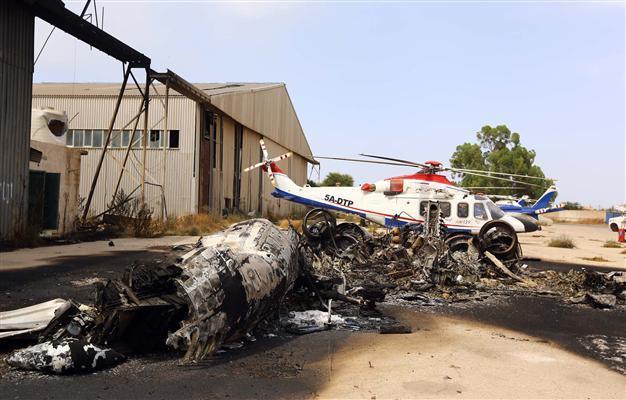Libya weighs international help after surge in violence
TRIPOLI - Agence France-Presse

A charred airplane lies on the ground at Tripoli international airport in the Libyan capital on July 14, 2014 following fighting between rival armed groups. AFP Photo
Libya's government said Tuesday it was considering calling for international forces to help re-establish security after deadly clashes closed Tripoli airport, severing air links with the outside world.
Fighting between liberal and Islamist militias locked in a brutal power struggle forced the closure of the country's main international airport, leaving the North African state feeling increasingly isolated.
On Monday, the United Nations announced it was evacuating its remaining staff from Libya because of the deteriorating security situation.
The locked-down airport came under renewed attack late Monday when dozens of rockets -- including one that hit a plane -- were fired, killing a security guard and injuring six others, officials said.
Al-Jilani al-Dahech, a security official at Tripoli airport, told AFP that the control tower was hit along with a plane belonging to private Libyan carrier Buraq Airlines.
Shortly after the attack the government released a statement saying it was "looking into the possibility of making an appeal for international forces on the ground to re-establish security and help the government impose its authority".
The statement from a spokesman added that the forces would help protect civilians, prevent anarchy and allow the government to build up the army and police.
International air power helped overthrow dictator Moamer Kadhafi in 2011, sparking a power struggle between rival armed groups that has wracked the oil producing state.
Fighting between militias has intensified since a general election in June and the UN said it was withdrawing its remaining staff.
"UNSMIL (United Nations Support Mission in Libya) temporarily withdrawing staff from Libya because of security situation," the mission, which already pulled out dozens of personnel last week, said in a statement.
"After the latest fighting on Sunday and because of the closure of Tripoli international airport, the mission concluded that it would not be possible to continue its work... while at the same time ensuring the security and safety of its staff," it said.
"This is a temporary measure. Staff will return as soon as security conditions permit. The United Nations, which stood by the Libyan people in their revolution in 2011, will not abandon them as they seek to build a democratic state."
Witnesses said a UN convoy left Tripoli on Sunday by road headed for the Tunisian border, 170 kilometres (110 miles) to the west.
Tripoli international airport was shut down for at least three days after the Zintan militia which controls it came under attack by Islamist fighters on Sunday.
On Monday, Libya also suspended all flights to and from third city Misrata, west of the capital, which is dependent on Tripoli airport for its operations.
"Libya is now practically cut off from the outside world," a source at the airport said.
At least 10 aircraft of Libya's main carriers Afriqiyah Airways and Libyan Airlines were damaged in the fighting, a security official said.
An AFP photographer sighted several passenger aircraft on the tarmac riddled with bullets.
Sunday's Tripoli airport attack was claimed by Islamist militias determined to oust the Zintan group from key sites it controls in south of the capital, including the airport.
The attack was beaten off, but there were also clashes at other Zintan-controlled sites for several hours, especially on the road to the airport.
Libya has been awash with weapons since the NATO-backed uprising three years ago that toppled and killed Kadhafi.
Successive interim governments in Tripoli have struggled to establish a strong army and police force, giving former rebel groups a free hand to act.
The well-armed and disciplined Zintan militia has sided with well-armed forces loyal to renegade former general Khalifa Haftar who launched an offensive against Islamist militias in second city Benghazi in mid-May.
Libya's neighbours -- Algeria, Chad, Egypt, Niger, Sudan and Tunisia -- issued a call for dialogue on Monday.
They agreed at talks near Tunis to set up twin commissions to broker talks and attempt to prevent any spillover of violence.
Delegates underlined the need to "resolve (the problem of) pockets of terrorism in Libya, which are a source of concern for Libya and the countries in the immediate vicinity".
Eastern Libya, particularly its main city Benghazi and the hill town of Derna, have become strongholds of jihadist groups.
Renewed clashes between troops and Islamist militia in Benghazi on Monday killed at least seven people and wounded 49, medics said.
The European Union called for the new parliament elected in last month's controversial poll to convene as quickly as possible and form a new government to head off worsening violence.
"The EU trusts that the new parliament will be in a position to embody national consensus and play its role in forming a government with wide political support," it said.
